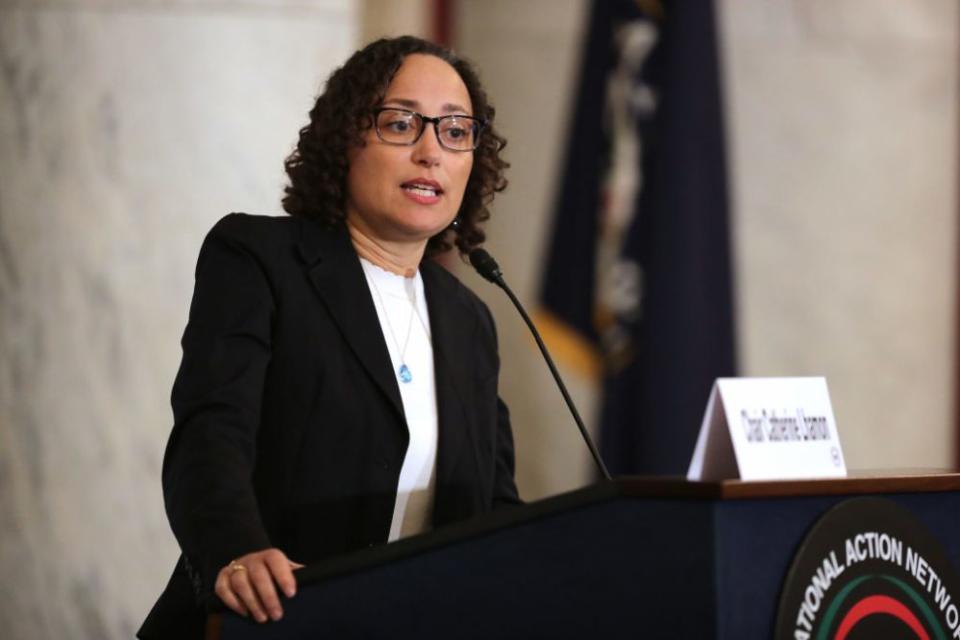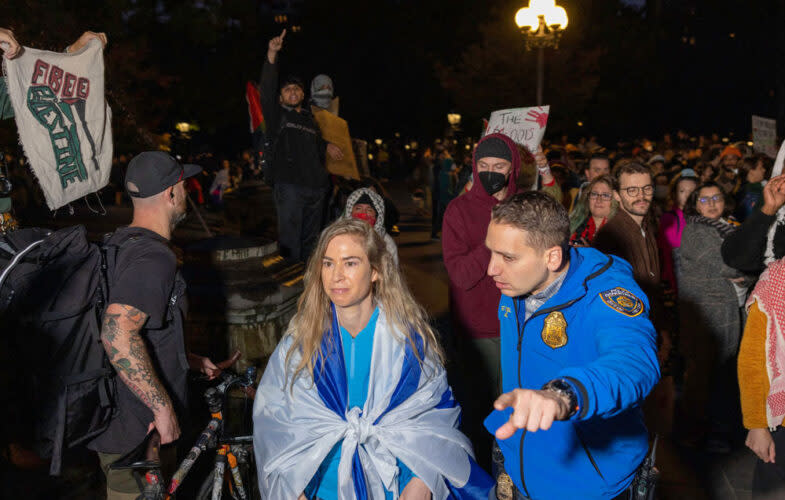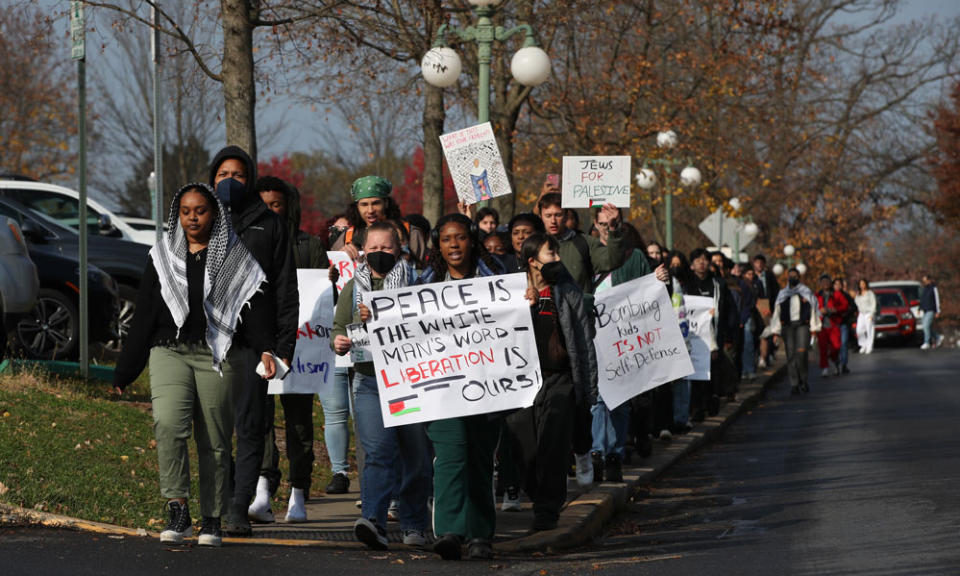‘Huge Influx’ of Civil Rights Complaints to U.S. Ed Dept Since Israel-Hamas War

Updated Jan. 2
Amid reports of heightened antisemitism and Islamophobia in schools and colleges since the start of the Israel-Hamas war, a senior Education Department official said the agency has received a “huge, huge influx” of civil rights complaints that have led to a surge in federal investigations.
Since the Oct. 7 attack by Hamas terrorists on Israel and the subsequent bombing and invasion of Gaza by the Israeli military, the Education Department’s Office for Civil Rights has opened 29 investigations into schools’ and colleges’ responses to complaints of discrimination based on shared ancestry, which includes antisemitism and Islamophobia.
Of the new investigations, the senior official told The 74, 19 are in response to conduct that unfolded in schools in the last two months alone. Of the incidents since Oct. 7 that are now under investigation, 17 took place on college campuses.
Support The 74's year-end campaign. Make a tax-exempt donation now.
Last fiscal year, by contrast, the office opened 28 shared ancestry investigations over the entire 12-month period. The year before, there were just 15. Such inquiries seek to determine whether schools adequately respond to incidents that create hostile learning environments in violation of Title VI of the Civil Rights Act, which prohibits discrimination based on race, ethnicity or national origin.
“We are deeply concerned about the incidents that we’ve seen reported in schools all over the country, and about the safety of students, and the protection of non-discrimination rights for students in P-12 schools as well as in institutions of higher education,” Catherine Lhamon, the department’s assistant secretary for civil rights, said in an interview Wednesday with The 74. “We’re very, very concerned about what we’re seeing in schools.”

Though officials declined to comment on the specifics of active federal investigations, a spike in reported antisemitic and Islamophobic incidents in and outside of schools have convulsed the nation and elevated student safety concerns.
Near Louisiana’s Tulane University, a clash between pro-Palestinian and pro-Israel protesters turned violent and police are investigating a hit-and-run at Stanford University as a potential hate crime targeting an Arab Muslim student. At Rutgers University, officials suspended its “Students for Justice in Palestine” chapter following claims the group disrupted classes and vandalized campus. At Harvard University, a rabbi said he was instructed by administrators to hide the campus menorah each night of Hanukkah due to vandalism fears. In California, a college professor was charged with involuntary manslaughter and battery after an alleged physical altercation broke out at a demonstration that led to the death of a Jewish protester.
Outside of schools, police said a 6-year-old Chicago boy was stabbed to death and his mother seriously injured by their landlord in an alleged anti-Muslim attack, and in Burlington, Vermont, three college students of Palestinian descent were shot while walking down a sidewalk over Thanksgiving weekend.
The escalating confrontations have embroiled school leaders, who have been criticized for failing to clamp down on hate speech and discrimination. Just days after a tense Dec. 5 House committee hearing in Washington about rising antisemitism on college campuses, Elizabeth Magill resigned as University of Pennsylvania president. She and the presidents of Harvard University and the Massachusetts Institute of Technology were accused of being equivocating and evasive after giving carefully worded replies to repeated questions about whether calling for the “genocide of Jews” violated their schools’ code of conduct. Magill responded that it’s “a context-dependent decision,” underscoring school leaders’ obligations to ensure safe learning environments while protecting people’s free speech rights.
Harvard University President Claudine Gay announced her resignation Tuesday after facing similar scrutiny for her testimony at the congressional hearing and unrelated plagiarism allegations.
Of the 29 active federal Title VI investigations opened since Oct. 7, just eight are focused on incidents in K-12 schools — including at three of the nation’s 10 largest districts. Among them are the New York City Department of Education, the Clark County School District in Las Vegas, Hillsborough County Schools in Tampa, Florida, and the Cobb County School District in suburban Atlanta.

Though the circumstances prompting the investigations remain unknown, many of the institutions included on the Education Department’s list of active investigations have experienced high-profile incidents involving discrimination.
In New York City, a raucous, pro-Palestinian protest broke out at a Queens high school and prompted a lockdown after a teacher posted a picture of herself at a pro-Israel rally on social media. Also turning to social media, one student said the teacher “is going to be executed in the town square,” and another promoted “a riot” against her.
In suburban Atlanta, the Cobb County School District sparked controversy following the Hamas attack when it sent an email to the school community that warned of an “international threat,” noting that “while there is no reason to believe this threat has anything to do with our schools, parents can expect both law enforcement and school staff to take every step to keep your children safe.” Because of the message, several Muslim parents said their children had become the targets of Islamophobic bullying.
In a January fact sheet, the civil rights office highlighted hypothetical instances that put school districts at odds with their Title VI obligations. Among them: A Jewish student is targeted by his peers with swastikas and Nazi salutes but his teacher tells him to “just ignore it” without taking steps to address the harassment. Another example involves school officials failing to remedy a Muslim student’s complaints that she was called a “terrorist” and told “you started 9/11.”

Even before the most recent conflict between Hamas and Israel, law enforcement agencies across the U.S. have reported an uptick in hate crimes over the last several years, including on campuses.
Reported hate crimes surged 7% between 2021 and 2022, according to federal data released by the Federal Bureau of Investigation in October, including a 36% increase in anti-Jewish incidents — which accounted for more than half of incidents based on religion. Among all reported hate crimes, 10% occurred at K-12 schools and colleges.
First Civil Rights Data Since COVID Reveals Racial Divide in Advanced Classes
The Education Department last month released its most recent Civil Rights Data Collection, the first since the pandemic. Students reported 42,500 harassment allegations during the 2020-21 school year, including bullying on the basis of sex, race, sexual orientation, disability and religion. Of those, 29% involved harassment or bullying on the basis of race while only a sliver — 3% — involved students saying they were targeted because of their religion.
The current climate has put Jewish college students on edge, according to a recent survey by the Anti-Defamation League, a nonprofit focused on eradicating antisemitism. Since the beginning of the academic year, 73% of Jewish college students said they’ve been witness to antisemitism. Prior to this school year, 70% reported experiencing antisemitism throughout their entire college experience. Yet just 30% of Jewish college students said their college administration has taken sufficient steps to address anti-Jewish prejudice.
During a televised interview on MSNBC Friday, Jonathan Greenblatt, the national director and CEO of the Anti-Defamation League, said he thought conditions would improve on college campuses for Jewish students because the Title VI investigations now being launched by the Education Department would force college administrators to take action.
Muslim Americans of all ages have similarly reported an uptick in hateful rhetoric. In a two-week period between Oct. 7 and Oct. 24, reports of bias incidents and requests for help at the Council on American-Islamic Relations surged 182% from the average 16-day period in 2022.
How White Extremists Teach Kids to Hate
As lawmakers call on school leaders to take a stronger stance against hate speech, they’ve faced pushback from free speech advocates. Earlier this month, New York Gov. Kathy Hochul warned university presidents of “aggressive enforcement action” if they failed to discipline students “calling for the genocide of any group of people.” In a statement, the Foundation for Individual Rights in Education, a right-leaning nonprofit focused on students’ free speech rights, said Hochul’s admonition “cannot be squared with the First Amendment.”
“Colleges and universities can and should punish ‘calls for genocide’ when such speech falls into one of the narrowly defined categories of unprotected speech, including true threats, incitement and discriminatory harassment,” the group said in the statement. “But broad, vague bans on ‘calls for genocide,’ absent more, would result in the censorship of protected expression.”
The senior Education Department official said that schools must “navigate carefully” their obligations under Title VI and the First Amendment. Even if a student’s speech is protected, the official said, school leaders still have an obligation to uphold all students’ nondiscrimination rights.
“What concerns me is when a school community throws up its hands and says, ‘This speech is protected and so there’s nothing more for us here,’” said Lhamon, the assistant secretary for civil rights. “That may be true, but that’s only true where a hostile environment isn’t created that the school needs to respond to.”

